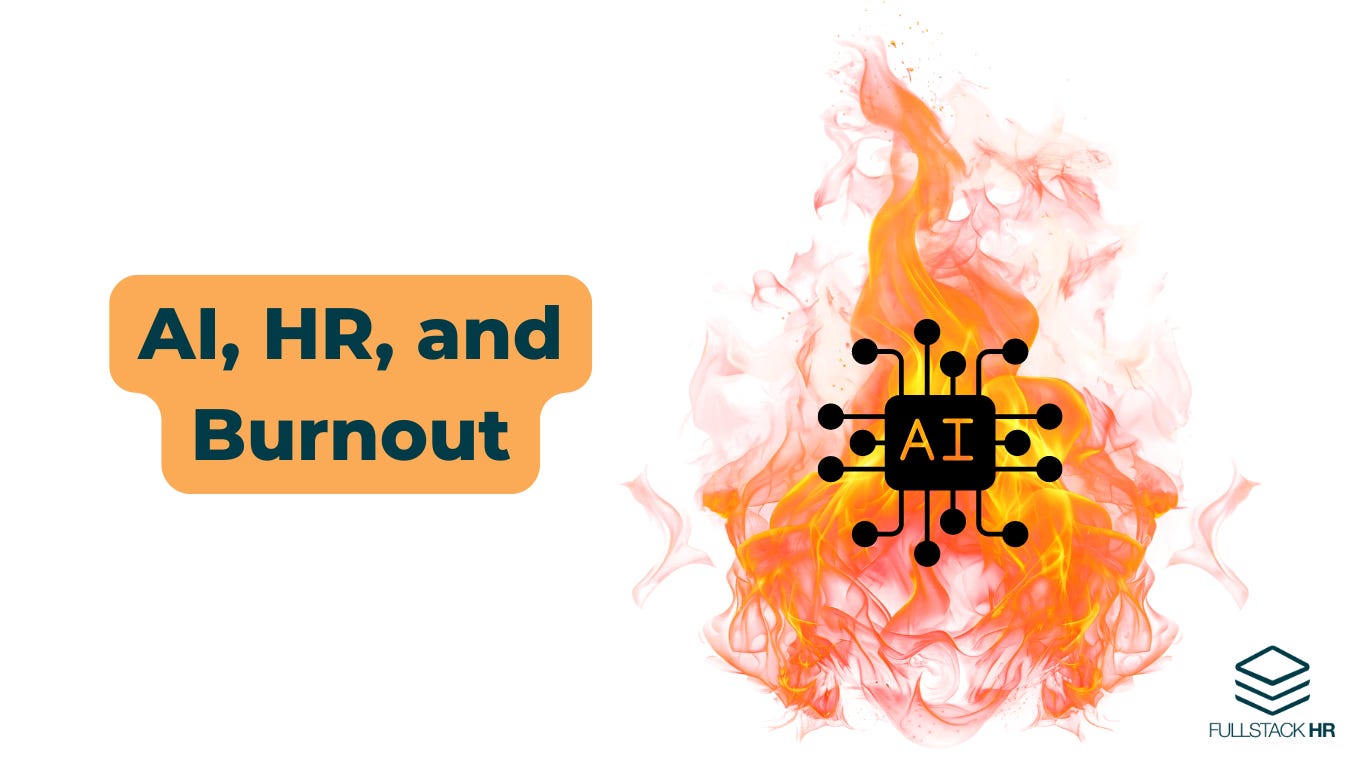AI, HR, and Burnout
Will AI save your workforce?
Welcome to FullStack HR, and an extra welcome to the 42 people who have signed up since last week. If you haven’t yet subscribed, join the 7300+ smart, curious HR folks by subscribing here:
Happy Tuesday,
Yes, apparently I post stuff on Tuesdays now.
I aimed for Friday, but I failed miserably.
So here we are again on a Tuesday.
Today’s topic concerns what we can do with all the productivity gains from working with Generative AI.
Let’s get to it.
Are you looking to unlock productivity gains in your organizations?
I specialize in helping global teams navigate AI, driving tangible results by streamlining processes and empowering organizations to embrace the AI-change.
From boardrooms to family-owned businesses, I’ve partnered with CEOs, CHROs, and HR teams to create strategies that align with business goals and transform how they work.
Whether it's Fortune 500 companies or startups, I bring deep expertise and proven results to the table, guiding organizations through the future of work.
Need help?
When I gave my first lecture on what AI would mean for HR 20 months ago (thanks to H&M for daring to take a chance on me!), I was asked what this would mean for productivity.
I completely understand that question, and I bring it up myself in all the lectures I give.
In a world where efficiency and productivity are constantly sought after, these topics naturally take center stage. Existing studies on AI and employee relations also focus on this—how AI impacts productivity.
The jagged frontier of AI revolves around this, as does the recently released study, The Effects of Generative AI on High-Skilled Work: Evidence from Three Field Experiments with Software Developers, which explores how AI affects software developers' work performance.
In the media, Klarna is often highlighted as an example of a company that saved the equivalent of 700 full-time customer service roles through AI (although my reliable sources suggest the actual number of layoffs is significantly lower).
Now, most recently, they plan to reduce their total headcount by 50%.
But is reducing headcount the only outcome we want from AI? If this becomes the primary lever we pull, what message does it send to our organizations?
Does it imply that while learning AI is valuable, it also comes with the threat of long-term redundancy? Don’t get me wrong—I understand the need to save money.
People are costly, and businesses must be profitable—I don't question that at all.
However, I believe we have an enormous opportunity to create a long-term, sensible, and sustainable work environment for a large number of people if we dare to engage in the conversation.
And lean into it. Have opinions. Rethink our approach.
Because while AI developments are rapidly advancing, we continue to face significant challenges with stress and burnout in our organizations. In the U.S., it’s estimated that work-related stress costs businesses between $125 and $190 billion annually.
The problem is similarly widespread in Europe. In one UK study, almost half of workers reported being close to burnout. In Sweden, the cost of sick leave is $6.2 billion each year.
A Gallup and Workhuman report showed that burnout among employees costs companies $322 billion globally—every year.
And this is only considering the financial loss to companies.
It’s a lesser problem when compared to the suffering and consequences for individuals.
I’m convinced—perhaps even naively so—that AI could significantly reduce this issue, but it won’t happen on its own.
So, who should lead this charge?
We in HR should do it.
If we can grasp AI, we already understand the immense cost of burnout for both organizations and individuals. We have a responsibility and an opportunity to shift our focus from short-term productivity gains to greater employee well-being and pursue long-term cost reductions.
A win-win.





@Johannes, thought provoking read as always. Here's a thought I have been mulling over: Will AI become the cure for mass layoffs? Right now, this is the opposite.